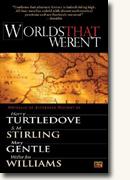Worlds That Weren't
Harry Turtledove et al
book reviews:
· general fiction
· chick lit/romance
· sci-fi/fantasy
· graphic novels
· nonfiction
· audio books
· author interviews
· children's books @
curledupkids.com
· DVD reviews @
curledupdvd.com
newsletter
win books
buy online
links
home
for authors
& publishers
for reviewers

 |
Worlds That Weren't Harry Turtledove, S.M. Stirling, Mary Gentle & Walter Jon Williams Paperback Roc 320 pages July 2005 |
|
There is no doubt that each author deserves kudos for the in-depth research he or she most certainly undertook to develop these stories. Imagination alone warrants much credit as well. Not many philosophy students, no matter how bored they might occasionally find themselves, would think of matching Nietzsche up against the Earp brothers. But a problem does exist. To get the most out of AH stories, how much of the history does a reader need to know? Even grade-schoolers know that the South didn’t win the Civil War and that Hitler was defeated by the Allies in WWII, two favored AH subjects. And they would be fairly sure a meteor shower didn’t strike in the 1800s leaving India in charge of most of the world. But how many of us, even someone such as myself who earned a degree in history, would know offhand whether or not Sokrates fought in Sicily or who controlled North Africa in the 1400s? It is important to know when reading an alternate history story at what point history changes. In the case of the four novellas in Worlds That Weren't, as with most AH stories, the change took place before the story began. Unless the reader is a scholar or an armchair historian, he may be left wondering what happened in the real world and what didn’t. The authors and/or editors of Worlds That Weren't perhaps tried to compensate for a supposed lack of knowledge on the reader’s part by including at the end of each novella a concise paragraph consisting of true facts. My advice for the layperson picking up this book for the first time is to look at this paragraph first. You’ll spend less time being distracted by your own questions. © 2003 by April Galt for Curled Up With a Good Book |
| Also by Walter Jon Williams: |
|
|
|
 Click here to learn more about this month's sponsor! |
|
| fiction · sf/f · comic books · nonfiction · audio newsletter · free book contest · buy books online review index · links · · authors & publishers reviewers |
|
| site by ELBO Computing Resources, Inc. | |
 Certainly Harry Turtledove tops the list of SF writers of alternate history. He leads off this compilation with “The Daimon,” where in ancient Greece the philosopher Sokrates joins former student Alkibiades in war against Sicily. In S. M. Stirling’s “Shikari in Galveston,” a nineteenth-century meteor shower results in an empire based out of India and a twenty-first century America which hasn’t progressed much since. The main character in Mary Gentle’s “The Logistics of Carthage” is a warrior woman fighting in mid-fifteenth century North Africa who is visited by a woman archaeologist from the future. The fourth story, Walter Jon Williams’ “The Last Ride of German Freddie,” puts German philosopher Friedrich Nietzsche right in the middle of the Gunfight at the O.K. Corral.
Certainly Harry Turtledove tops the list of SF writers of alternate history. He leads off this compilation with “The Daimon,” where in ancient Greece the philosopher Sokrates joins former student Alkibiades in war against Sicily. In S. M. Stirling’s “Shikari in Galveston,” a nineteenth-century meteor shower results in an empire based out of India and a twenty-first century America which hasn’t progressed much since. The main character in Mary Gentle’s “The Logistics of Carthage” is a warrior woman fighting in mid-fifteenth century North Africa who is visited by a woman archaeologist from the future. The fourth story, Walter Jon Williams’ “The Last Ride of German Freddie,” puts German philosopher Friedrich Nietzsche right in the middle of the Gunfight at the O.K. Corral.